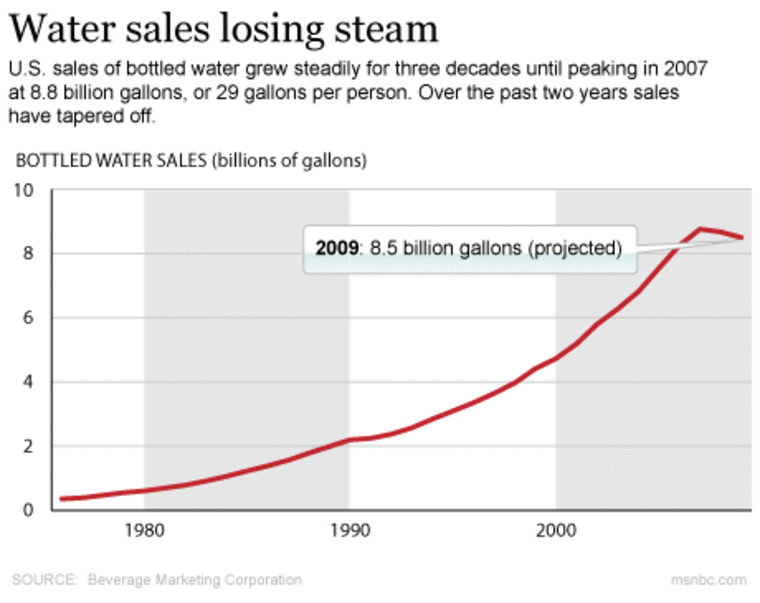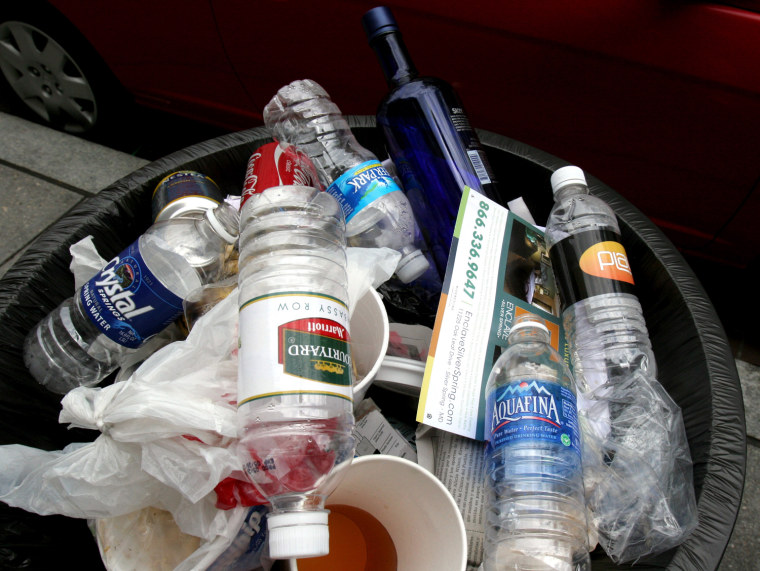Heather Lewis was wracked with guilt when she realized she was addicted to the bottle.
Bottled water, that is.
At her worst, she said she went through five plastic bottles of water a day nearly every day for two years.
“It was appalling,” said Lewis, an architect from Louisville, Colo. “I felt like Aquafina’s trained monkey.”
But one day in January, as she gazed at the piles of plastic in her recycling bin, she decided to quit. “It was a cumulative sense of responsibility that made me do it,” Lewis said
Lewis is part of a bigger backlash against bottled water happening across the nation, and after decades of growth, the $11 billion industry is stuttering.
After steady expansion that saw U.S. per capita consumption grow from less than two gallons a year to a peak of 29 in 2007, bottled water sales slipped 3.2 percent in 2008 and are projected to dip another 2 percent this year, according to estimates by the Beverage Marketing Corporation, a New York research and consulting firm.
The primary cause of the decline is hotly contested.
Industry executives say the downturn is purely due to the economy. “We don’t think that anti-bottle water activists have had any impact,” said Tom Lauria, spokesman for the International Bottled Water Association. “People love their bottled water.”
Every other bottled beverage segment — soda, energy drinks, tea and the like — saw even worse sales declines this year, said Gary Hemphill, managing director of Beverage Marketing Group, a research and consulting firm in New York.
“Environmental concerns among consumers may have had an effect on bottled water sales, but the primary reason sales are soft is the economy,” he said.
Certainly environmental groups are eager to take credit after campaigning for years against the industry over waste, safety concerns and the corporate privatization of water.
Restaurants, towns ditch the bottle
And there is no doubt the campaign has resulted in some high-profile changes.
Hundreds of high-end restaurants — from celebrity chef Alice Waters’ Chez Panisse in Berkeley, Calif., to Mario Batali’s Del Posto in New York City — now serve tap instead of bottled water.
In some towns, residents are protesting and rejecting large-scale water extraction by big water bottlers. Even during a severe recession, residents of Wells, Maine, rejected last month a proposal to extract up to 250,000 gallons a day from an aquifer for Nestlés Poland Spring brand.
New York, Illinois and Virginia state governments now bar bottled water at public events and in state offices. Cisco and Google ditched it from their corporate campuses as well.
“In some ways, bottled water has become the SUV of the ecological movement,” said Tony Clarke, director of the Polaris Institute, a Canadian nonprofit that organized an anti-water bottle campaign called “Inside the Bottle.”
Web sites like InsidetheBottle.org, TakeBackTheTap.org and ThinkOutsideTheBottle.org encourage consumers to ditch the bottle, while environmental research groups like the Environmental Working Group publicize startling facts like the existence of an area twice the size of Texas in the Pacific Ocean awash with millions of plastic water bottles and garbage.
Companies take notice of protests
Environmental concerns are not going ignored by big bottle water producers like Nestlé, the world's largest water bottler.
Nestlé has introduced bottles with less plastic and launched a new brand of water called Resource that uses bottles made of 25 percent recycled plastic. The company also is doling out local grants for recycling programs.
“We recognize we have an environmental footprint and it’s possible to lower it,” said Jane Lazgin, Nestlé spokeswoman. “We think about that every day.”
PepsiCo and Coca-Cola also have launched bottled water products that use less plastic.
Next on the horizon for the industry: compostable bottles made from corn, said Lauria. “We will see in our lifetime biodegradable plastic, and this whole controversy will disappear,” he said.
Maybe, or maybe not.
Besides the concern about waste, a separate battle rages over privatization of shrinking water resources and the impact of bottled water operations on local aquifers, wildlife, water quality and community access to drinking water.
Voters in Shapleigh, Maine, this year passed an ordinance that protects groundwater rights for citizens but not corporations. The nearby town of Fryeburg has been in litigation with Nestle for six years over the company's expansion plans. Similar protests have played out in McCloud, Calif., and in Mescota County, Mich.
“There’s a realization that bottled water is simply taken from a community and put in a bottle with a giant price tag,” said Jon Keesecker, senior organizer of the Take Back the Tap campaign at Food & Water Watch in Washington D.C. “Many of these small communities feel like they’re being cheated by these corporations.”
Executives of Nestlé, which has faced criticism for its extraction practices, say they use groundwater just as any farmer or beer plant might, and its 75 springs provide jobs and economic diversity to small communities.
“The health of these springs requires vigilance to be sure they’re stable and safe and sustainable, and that allows us to be in business,” said Lazgin, Nestle spokeswoman.
Water safety questioned
Meanwhile, YouTube videos, research studies and press releases continue to fly about another controversy — the health and safety of tap vs. bottled water.
Each side argues over which water is more highly regulated. The Environmental Protection Agency oversees tap water while the Food & Drug Administration examines bottled water, so they’re handled differently.
“For the last 10 to 15 years, bottled water companies have been marketing that theirs was safer and healthier than tap water,” said Patti Lynn, campaign director at the environmental group Corporate Accountability International. She said the marketing undermined consumer confidence in tap water as well as necessary public investments needed to maintain public water systems, which face a $24 billion gap in funding.
So environmental groups have been making their case against bottled water on safety. Last year, the Environmental Working Group looked at 10 brands of bottled water and found that bottled water can contain complex mixtures of industrial chemicals never tested for safety, and may be no cleaner than tap water.
Bottled water companies defend their water and claim they are highly regulated by the FDA. Industry Web site BottledWaterMatters.com reports that bottled water is tested 30 times more often than tap water and that the Centers for Disease Control attributes more than 19 million illnesses to tap and none to bottled water.
Congress held hearings on safety regulation of bottled water over the summer, and the Government Accountability Office issued a report that revealed current FDA rules don’t require certified laboratories for water testing of bottled water nor public disclosure of quality and contaminants found in bottled water as EPA rules do for tap water.
Earlier this month, Sen. Frank Lautenberg, D-N.J., introduced the Bottled Water Safety and Right-to-Know Act intended to inform consumers about what's in bottled water. Lautenberg has introduced similar legislation in the past.

